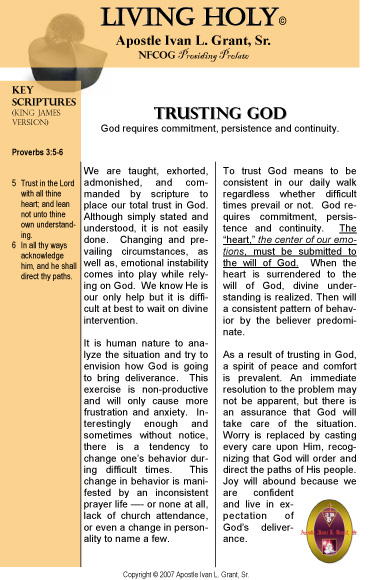Trust in the Lord with all thine heart; and lean not unto thine own understanding. In all thy ways acknowledge him, and he shall direct thy paths.
Proverbs 3:5,6
We are taught, exhorted, admonished, and commanded by scripture to place our total trust in God. Although simply stated and understood, it is not easily done. Changing and prevailing circumstances, as well as, emotional instability comes into play while relying on God. We know He is our only help but it is difficult at best to wait on divine intervention.
It is human nature to analyze the situation and try to envision how God is going to bring deliverance. This exercise is nonproductive and will only cause more frustration and anxiety. Interestingly enough and sometimes without notice, there is a tendency to change one’s behavior during difficult times. This change in behavior is manifested by an inconsistent prayer life — or none at all, lack of church attendance, or even a change in personality, to name a few.
To trust God means to be consistent in our daily walk regardless whether difficult times prevail or not. God requires commitment, persistence and continuity . The “heart,” the center of our emotions, must be submitted to the will of God. When the heart is surrendered to the will of God, divine understanding is realized. Then will a consistent pattern of behavior by the believer predominate.
As a result of trusting in God, a spirit of peace and comfort is prevalent. An immediate resolution to the problem may not be apparent, but there is an assurance that God will take care of the situation. Worry is replaced by casting every care upon Him, recognizing that God will order and direct the paths of His people. Joy will abound because we are confident and live in expectation of God’s deliverance.

Our monthly email newsletter keeps you up to date with the Nation of NFCOG.